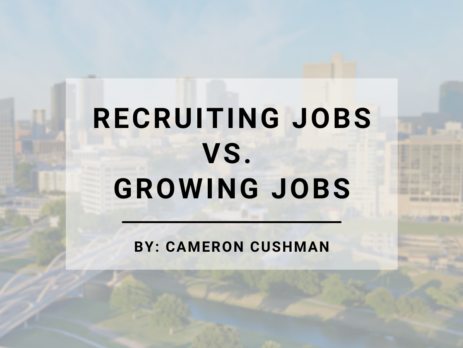If you follow economic development, you will often hear about how a big company looking to relocate will seek offers from various cities to move their company headquarters or open a new facility in exchange for incentives or favorable tax treatment. These announcements are often attached to the promise of new jobs that will be moved from another city or hired locally as the company expands.
This stands in direct contrast to local entrepreneurs who start and grow companies in their hometowns. This “organic” economic development can be a big boost for local economies that rely on these innovators and entrepreneurs to bring new products and services to market and can grow quickly. These new companies are often too focused on growth, if not survival, to seek government incentives like established companies do.
But, how do these two generators of economic development compare, particularly when it comes to job creation? And, what does that mean for Fort Worth?
New data and analysis reveal that new firms in Fort Worth create about 5.2 times more jobs than those companies that are recruited in a relocation effort.

The Numbers
To conduct this analysis, two data sets were used.
The first was based on a recent report from Sparkyard and Sourcelink that showed that in Tarrant County in 2019, almost 30,000 jobs (29,979 to be exact) were created by firms less than one year old.
To create a better comparison with job recruitment efforts, we distilled this number down based on the 2019 population. After we normalized this number for just the city of Fort Worth, we calculated approximately 12,500 jobs created by new firms in 2019. (Tarrant County’s population in 2019 was 2.1M versus 874K in the City of Fort Worth.)
According to the Fort Worth Chamber of Commerce, 9,561 jobs were created by companies that relocated to Fort Worth, over a four-year period (2018-2021). The majority of these were in Fort Worth, but some were in other municipalities. We averaged this number over the four-year period to estimate that 2,390 jobs were created locally by corporate relocations.
Therefore, in 2019, organic growth from new companies created 12,500 jobs. That same year, an estimated 2,390 jobs were added in Fort Worth from corporate relocations. This represents 5.23 times more jobs created by new companies in Fort Worth versus relocations.
Other Considerations
This analysis is based on pre-pandemic numbers. In the case of the Sparkyard Jobs Report, the numbers were from jobs created by new companies in 2019. For the Chamber data, the research was based on an average number of jobs attracted over a four-year period, from 2018-2021. In the first part of 2020, many people lost their jobs due to the pandemic, but the latter half of the year also represented a record year in new firm starts. In fact, 2020 was the best year on record for new business creation, according to the US Census Bureau. We will have to wait and see how the data and comparison comes out for future years to see the impact that the pandemic had on job creation.
Corporate relocations represented data from the Fort Worth Chamber of Commerce and relocation deals that in which they were involved. Additional data from the City of Fort Worth or local economic development organizations might show different results.
The authors fully realize that many corporate relocations that can have a big impact on our area may not fall strictly within Fort Worth city limits. Additional data for further analysis would be welcomed.
Finally, due to data limitations, the Sparkyard Jobs Report only counts new jobs created in the first year of a company’s existence. Many companies spend their first year just trying to survive and if they do, years 2-5 is where they expand by creating new jobs. The ability to measure the job creation in the first five years of a new company’s journey would significantly change this analysis, but additional data would be required from the State of Texas’ Workforce Commission (TWC).
The Meaning
So what does this analysis really mean?
This is just one way to look at the very complex world of economic development. In fact, this analysis oversimplifies the many competing factors that go into a growing, thriving local and state economy.
But, this does mean that when it comes to job creation, startup companies cannot be ignored. The job growth spawned by our own entrepreneurs, innovators, restauranteurs and risk-takers is significant and policymakers and economic development professionals should not ignore their contributions. There are a variety of ways cities and other stakeholders can invest into these job creators.
Plus, since entrepreneurs aren’t typically swayed by tax incentives, they are more likely to stay put and continue creating jobs. Since they typically won’t be looking to move when incentives run out, if they survive their startup phase, they tend to be more tied to their hometowns.
It also means that future recruitment packages and future discussions around economic development should be weighed against the impact that those dollars, incentives and tax breaks might have if applied to new firm starts.
These decisions are complicated and difficult, but the data are clear – when it comes to creating new jobs, new companies are a significant contributor to our local economy.




Comment (1)
Happy to discuss Economic Gardening